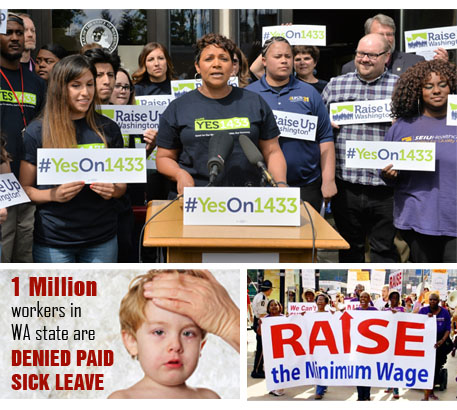OPINION
We can Raise Up Washington with Initiative 1433 this fall
By JOHN BURBANK
(Sept. 26, 2016) — The campaign for president is getting most of the media attention this year, but we have other important decisions to make as voters this November.
 Among the initiatives on the ballot is Initiative 1433, also known as Raise Up Washington. This initiative will put in place minimum standards for paid sick days across the state and increase the minimum wage. It is about giving workers, especially low-wage workers, respect, dignity, and a fair chance. It brings our minimum wage and workplace standards into the 21st century.
Among the initiatives on the ballot is Initiative 1433, also known as Raise Up Washington. This initiative will put in place minimum standards for paid sick days across the state and increase the minimum wage. It is about giving workers, especially low-wage workers, respect, dignity, and a fair chance. It brings our minimum wage and workplace standards into the 21st century.
The statewide minimum wage is currently $9.47 an hour. That amounts to less than $20,000 for full-time work. Raise Up Washington will raise the minimum wage in steps for the next four years: $11 in 2017, $11.50 in 2018, $12.00 in 2019, and $13.50 in 2020.
Raise Up Washington will also put into law the common-sense proposal that when you get sick, your child gets sick, or your mom needs help going to the doctor, you should be able to take time off of work without fear of losing your job or your wages. So with Raise Up Washington, for every 40 hours you work, you earn one hour of paid sick leave. This amounts to six and a half days of sick leave for full time, year-round work.
Let’s look at the minimum wage a bit more. The minimum wage was at its highest almost 40 years ago, in 1968. In inflation-adjusted dollars, it was $11.06 an hour. But workers have gotten a lot more productive in these past four decades, so workers together now produce two and one-third more in value for each hour of work. That is what we get for education, innovation, and investment.
The fruits of that increase in productivity used to be proportionally shared among workers and businesses. But since 1970, the wealth generated by productivity increases has gone more and more to corporate profits and CEO salaries, leaving workers with less and less to show for their contributions to the growth in our economy. If productivity increases were shared across the board, as they were up until 1970, our minimum wage would be more than $25 an hour. Seems almost fantastical, but that is what the statistics show. And it shows what is possible for shared prosperity, and how that prosperity was shared in the post-war period.
We have done this before. The people voted with a 3-to-1 majority to increase the minimum wage in 1989 and 1990. Again in 1998, the people voted 2-t0-1 to increase the minimum wage and then tie it automatically to inflation. That vote set a national standard and broke the ice across the country for states to increase their minimum wages, even as Congress twiddled its thumbs. Now Arizona, Colorado, Missouri, Florida, Montana, Nevada, New Jersey, and Oregon, among other states, have minimum wages that keep up with inflation.
Five states — California, Oregon, Connecticut, Massachusetts, and Vermont — and more than 30 cities have passed paid sick leave standards. This is not a simple red state/blue state breakdown. It seems that voters across the country know that the minimum wage should keep up with inflation and sick workers should be able to stay home.
The data also show that raising minimum standards helps communities thrive. Working people have a little more income, which they spend in local businesses. Workers also stay on the job longer and are more productive, so businesses have lower retraining costs and happier customers. That’s why companies are able to pay those higher wages with minimal impact on prices.
We have a chance to lead our state and our nation again in November by approving Initiative 1433. This time we won’t be alone. Several other states, including Oregon and California, have recently increased their states’ minimum wage. Colorado and Maine also have ballot initiatives to increase their minimum wages.
It is a sea change, across the country, in recognition of workers and the dignity of work. Work, with decent wages, makes possible life, liberty, and the pursuit of happiness. Let’s make sure all workers can grasp these “unalienable rights” written into our Declaration of Independence. Help us raise up Washington!

John Burbank is the executive director and founder of the Economic Opportunity Institute in Seattle. John can be reached at john@eoionline.org.





